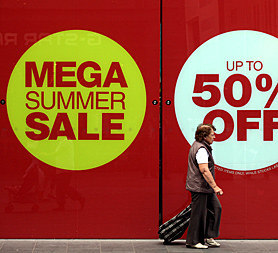Surprise inflation drop may stall interest rate rise
Record discounts in the summer sales help deliver a surprise fall in inflation, which economists say could see the Bank of England freezing interest rates until spring 2012.

The Consumer Prices Index (CPI) fell to 4.2 per cent in June, according to official figures, surprising the City which had forecast no change from May’s 4.5 per cent.
The Office for National Statistics (ONS) said record price cutting on the high street of digital cameras, DVDs and televisions, among other recreational goods, were by far the largest factor in pulling back inflation.
Prices were down 0.9 per cent from May to June, compared to the same period last year when goods were priced at 0.5 per cent more. Second-hand cars were also priced lower this year than last, the ONS said, as well as mobile phone bills.
Economists said the aggressive discounting highlighted the weak spending power of consumers, which retailers were being forced to meet.
The inflation data reinforce our view that the Bank of England will not hike interest rates before the second quarter of 2012. Howard Archer, chief UK economist, IHS Global Insight
Howard Archer, chief UK economist at IHS Global Insight, said: “The retreat in consumer price inflation in June boosts the case for the Bank of England to hold fire on interest rates for many more months to come to give the fragile, faltering economy every chance to develop growth momentum.
“Indeed, the inflation data reinforce our view that the Bank of England will not hike interest rates before the second quarter of 2012.”
The news sent the pound to a fresh five-month low against the dollar, as investors bet against an interest rate rise in the short term.
However, the Bank of England (BoE) will be encouraged by core inflation dropping to 2.8 per cent – the lowest figure since last November.
The BoE has been under pressure to raise interest rates to control rising prices, even though recent signs have suggested the economic recovery is stalling.
The Bank has argued there is little sign of an inflationary spiral in the UK. But despite this surprise fall, it is the 19th month in a row that inflation has exceeded the Bank’s target of 2 per cent.
The declines in inflation measures are likely to be temporary given the 15-20 per cent hikes in utility bills that will be coming through from August. James Knightley, senior economist, ING
The ONS said today that high food and fuel prices were to blame, offsetting the low prices on recreational goods.
Having fallen in price during from May to June last year, food prices climbed 0.9 per cent in the same period in 2011 – with everyday groceries such as bread and cereals, meat, milk, cheese and eggs, all more expensive this year.
Petrol prices also jumped, up 0.7 pence per litre between May and June, and now stand at 135.6 pence per litre. This time last year, petrol pump prices were down 2.6 pence per litre.
James Knightley, senior economist at ING, said: “The declines in inflation measures are likely to be temporary given the 15-20 per cent hikes in utility bills that will be coming through from August.
“Food prices are also set to rise further, given the lagged increases in raw food commodity prices.”
Mr Knightley said he still expects CPI to hit 5.5 per cent within the next three to six months.
-
Latest news
-
Windrush scandal: returning to the UK after a forty year wait6m

-
Netanyahu ‘survival’ depends on ‘expanding war’ says head of Palestinian National Initiative5m

-
Proposed law change could strip parental rights from paedophiles5m

-
Hugh Grant settles privacy lawsuit against The Sun newspaper publisher2m

-
Post Office Scandal: what did top executive know?6m

-




